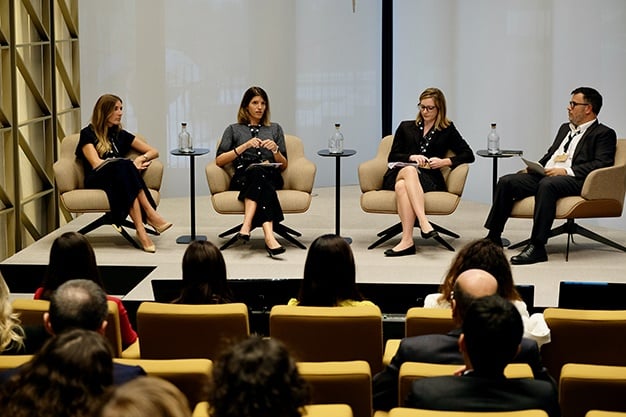Event Report
The Green Summit Portugal 2022 marked our second event associated with our new Global Green Guide and brought together leading practitioners and in-house counsel from across the country and region to discuss the legal sector’s engagement with and contribution to a green transition.
Panel discussions will address accelerating the green transition through corporate sustainability due diligence and co-operation, and the evolving role of the GC when it comes to sustainable practice and strategy.
After a welcome address and opening remarks by Anna Bauböck, editor of The Legal 500 Global Green Guide, and Bruno Ferreira, managing partner at PLMJ, two panel discussions addressed accelerating the green transition through corporate sustainability due diligence and cooperation, and the evolving role of GCs when it comes to sustainable best practice and strategy.
The first panel was moderated by Ferreira and within the context of the proposed Corporate Sustainability Due Diligence Directive explored if lawyers should shift their focus from minimising risks to promoting sustainability, and some of the imminent issues that must be tackled.
Claire Bright, founder and director of the NOVA Centre on Business, Human Rights and the Environment at NOVA Law School (NOVA BHRE) in Lisbon, gave a short presentation on the draft directive, including key provisions. She acknowledged the push and pull between EU Parliament which demands more, the EU Commission which is adamant to keep key provisions, the EU Council whose position varies, and parts of civil society who would like to extend the scope versus others who are lobbying to diminish it. She concluded that the directive will help to accelerate a green transition, although it has already been watered down, for instance with human rights and environmental due diligence requirements currently not including climate change.
Natália Galvão Veiga Rebelo, country legal manager at IKEA Portugal, described how sustainability has been a concern at IKEA since the company’s origin with the furniture store now selling home solar panels and producing more than consuming energy after purchasing a wind farm and converting it into a hybrid wind and solar facility. She detailed IKEA’s code of conduct “IWAY” which sets out mandatory requirements for suppliers which often go beyond local legislation; the company not just audits suppliers but assists them with the development of these standards. Lastly, she pointed out that often the inhouse function is more preventative than corrective, but GCs now have a role to break barriers and should enable not block when it comes to a green transition.
Rita Rendeiro, operating partner at Maingreen Capital Partners, stressed that all lies in the word “transition”: the only thing that is no longer allowed is not to have a plan; companies need a credible plan to move forward. In her opinion, most inhouse counsel have come to accept that they have a fiduciary duty to ensure a sustainable transition on behalf of the companies they manage. In her view, sustainability due diligence is paramount and life-long. Moreover, there’s a need to embrace sustainability due diligence and see it as an opportunity – and therefore, it should not be seen simply as a compliance topic or role. She also pointed out that there is a huge appetite for sustainable investments and strategies; in fact there aren’t enough investments for the demand.
The second panel was moderated by Raquel Azevedo, partner at PLMJ, and heard the perspective from three GCs in different segments of the energy sector about their role and experience when it comes to sustainability and a green transition.
Marta Cruz de Almeida, general counsel at Portuguese utility giant Galp, immediately referred to the need to facilitate a transformation for the future using the conventional energy sector’s existing tools, and the important role GCs must play in setting transparent, achievable and enforceable targets.
Gonçalo Noronha Andrade, lawyer at EDP, set out his vision for the short, medium and long-term role of the GC: First, it is a compliance and advisory role which involves the need to be knowledgeable of regulation and impact with the extra challenge of properly measuring risks. Subsequently, the role will become more strategic, as the legal team should be thinking about ESG strategically and defining strategy. Finally, in the long-term, the role will involve building expertise and thought leadership, attracting talent, and in three to five years ESG experts will need to be embedded within the team.
Marta Almeida Afonso, general counsel and company secretary at REN, described her close working relationship with the business development team, trying to partner with BD rather than putting obstacles in their way, for instance when recently implementing a new EV charging solution or a new hydrogen hub. She equally works closely with communities in the process of such projects, another important element of the legal function. Her company’s recently formed sustainability committee crucially includes executive and non-executive members, and one of two newly created departments deals exclusively with operational sustainability.
Cruz de Almeida pointed out how sustainability is no longer merely about a willingness to engage but investors and stakeholders are demanding it. She also recognised the need to look at what other players are implementing and the need to be open to what’s been done elsewhere. Almeida Afonso agreed that companies not engaging with sustainability will not have the same access to the financing market.
Noronha Andrade described how EDP was one of the first Portuguese green issuers (in October 2018); and it is now the sole instrument for financing with any refinancing going forward also prioritising green financing. EDP’s business plan to become 100 percent renewable was also incentivised by the market.
The discussion then moved on to sustainability indexes as drivers for sustainability or mere tick the box exercises. In Almeida Afonso’s experience they are a good driver when it comes to the “E” and the “S” by seeing and being inspired by good practices in other companies and countries. In Cruz de Almeida’s view, the indexes are very important as investors pay a lot of attention to it, and moreover, they oblige teams to do their own internal due diligence. In Noronha Andrade’s opinion, it is a challenging exercise in which not everyone asking the question understands the output or need.
Lastly, the speakers pointed to greenwashing and whistleblowing as two examples of the next big hot topics within the ESG space, and concluded that the best ESG strategy is one that sees opportunity in it.
The evening was rounded off by a reception with drinks and canapés in PLMJ’s gallery space, giving participants and speakers a chance to mingle, network and continue the conversation, as well as view the firm’s art collection.

